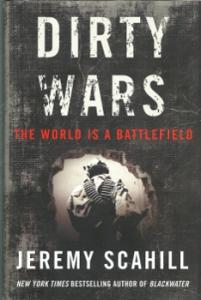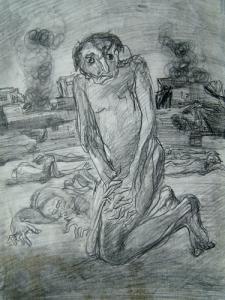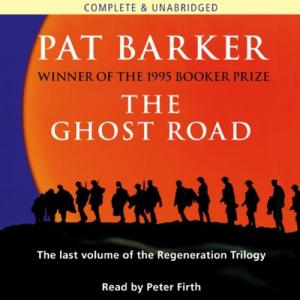This book offers important insights into US covert military operations over the past decade. While US drone strikes tend to get the headlines, behind the scenes – and perhaps even more lethal – is the work of the Joint Special Operations Command (JSOC) on which much of this book is focused.
In the first 100 pages, Scahill traces the rise of the neocon movement back to Watergate, and…
War and peace
Lately I have been thinking – once again – about desertion from the military. This time, I’ve been prompted by reading a review (not the book) of Deserter: The Last Untold Story of the Second World War by Charles Glass (HarperPress, 2013, £25). The review reveals that ‘as many as 100,000 British and 50,000 US Servicemen are believed to have deserted at some point’. I hope to return to this book about ‘the final taboo’ in a future PN.
But taboo? Well, that’s as maybe but…
Chemical bombing of Halabja, 1988, pencil (30 x 42cm).
Osman Ahmed
As the US and Britain threaten to attack Syria on the basis of an alleged chemical weapons attack on the Ghouta suburb of Damascus, confirmation has emerged of US government complicity in Iraqi chemical weapons attacks during the eight-year Iran-Iraq war.
As PN went to press, UN…
Wobbly Tuesday is one of the great secrets of the Iraq war, kept secret not by state censorship and repression, but by media and academic self-censorship.
Nearly 10 years on, it is time for the British anti-war movement to finally shake off the lie that the astonishing anti-war mobilisation of early 2003 had no effect whatsoever on the British government.
It is time for the peace movement to celebrate how close it came to detaching Britain from the US-led invasion of Iraq in…
In late September, more than 300 children from 10 schools in and around Wrexham took part in locally-organised 'World Peace Days' focused on peace, conflict resolution and nonviolent resistance.
Signing singing lesson during Wrexham Peace Days 2012 Photo: Paul LowndesThe three-day event (20-22 September) took place in a school on one day and then on the library green. Grassroots activists, musicians, poets, artists, cooks, holistic therapists, photographers and film-makers…
A postgraduate course in peacemaking through sport starts this month in Spain at the Open University of Catalonia, supported by the UN cultural body, UNESCO, and FC Barcelona Foundation.
The master's degree in 'Sport as a Tool for Social Coexistence and Conflict Resolution' is designed to be useful in contexts with 'high levels of conflict'.
Back in June, a former US presidential advisor and Harvard University professor, Graham Allison, described the current confrontation with Iran as 'a Cuban missile crisis in slow motion': 'Events are moving, seemingly inexorably, toward a showdown in which the US president will be forced to choose between ordering a military attack and acquiescing to a nuclear-armed Iran'.
(In fact…
On 27 October 1962, a Russian naval officer named Vasili Arkhipov saved the world.
Twelve US navy ships (part of the US blockade of Cuba during the Cuban missile crisis) were dropping practice depth charges on B-59, a submerged Soviet submarine, trying to signal that the sub should surface. The captain of B-59, Valentin Grigorievitch Savitsky, panicked, believing that the Third World War had started. He gave orders to fire a nuclear torpedo, saying, according to one account: 'We're…
Many PN readers will remember these critically acclaimed books, charting events in the final years of the First World War, from when they first appeared in the early 1990s. The first was later made into a film and the third won the Man Booker prize.
The two main characters are the fictional Billy Prior and the non-fictional William Rivers, an army doctor who treated victims of war trauma. In the first book, two of Rivers’ patients are the war poets Siegfried Sassoon and…
Despite the abandonment of “Hate Training” by the military authorities, the nation is still confronted with the difficult problem - Exactly how much hate ought we to have?
There is a lamentable divergence of opinion on this matter. At one extreme we have the Archbishop advocating no hate at all and exhorting us to love the enemy while killing him. At the other extreme, the Marquis of Donegal advocates 100 per cent hatred and “German justice for 90 million German vermin”.
Both…
The stated British policy to regain control of the islands by backing up diplomatic pressure with military might, in effect using the task force as a political weapon, is bound to lead to confusion.
When does a military engagement leave the political arena and become a political weapon? ... Military means subvert the political process, and then, with the weakening of non-military action, an increase in military action becomes…
The prospect of war over the Falkland Islands has been viewed with enthusiasm by headline writers, and politicians of all persuasions have been competing in jingoistic declarations that Britain should show it is still a great power. They entirely miss the essential point that the outbreak of violence can only lead to deaths and casualties among the Falklanders themselves as well as servicemen.
This is the central argument of the statement by British pacifists we reprint here. It…
A big book in every sense, The Death of Others looks at the fate of civilians in American wars since 1945 – focussing on the Korean War, Vietnam, Iraq and Afghanistan.
John Tirman, executive director of the Center for International Studies at MIT and the person who commissioned the 2006 Lancet study on deaths in Iraq, argues that the American public is indifferent to the suffering of civilians in the wars their tax dollars pay for – just as the US military has little concern for…
In 2005, a group at the University of Tromsø in Norway decided to create online training courses based on the ideas of Johan Galtung, the Norwegian sociologist who founded peace and conflict studies.
Professor Galtung defines peace as the capacity to handle conflict in a creative and empathic way. Galtung, who said that ‘violence is to peace what disease is to health’, believes that health professionals and others have a moral responsibility to address violence whenever they encounter…
People forget too quickly. This little book is a great reminder of much that has been achieved, so far, by Labour Action for Peace which began life in 1940 as the Labour Pacifist Fellowship.
Long before then, back to the days of Keir Hardie, there have been those in the Labour party with the same vision and hope.
The book is a fascinating trip down memory lane, from the introduction by Tony Benn to the cheery photo of current LAP president, Jeremy Corbyn.
The cast is…







